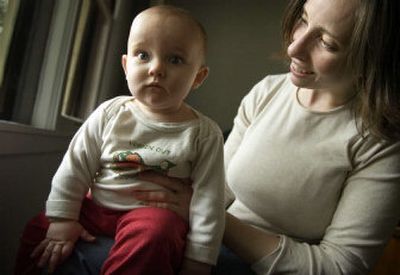Tinkle, tinkle little star

Little Gavin Ford is just 8 months old and he hardly ever wears diapers. Is he potty trained? Well, no, not exactly. He can’t even walk yet. But he’s able to give cues to his mom, Tara Ford, that he needs to go to the bathroom. And, 70 or 80 percent of the time, he makes it to the potty. And when he doesn’t, his mom cleans him up and grabs a fresh pair of pants.
“It’s a lot easier than changing a diaper,” says Ford, a 28-year-old stay-at-home mom from Spokane.
Ford, who also has a 3-year-old son, is one of a growing number of parents practicing “elimination communication” with even the youngest of infants.
Besides avoiding rashes, saving money on diapers, and minimizing impact on the environment, parents say the early toilet-training technique is simply another way to bond with their little ones.
“This is another tool that helps you to understand your baby,” Ford says.
Two Massachusetts moms started the nonprofit group DiaperFreeBaby in 2003 to raise awareness of the technique and encourage local support groups to form. There are now groups in 37 states and 12 countries.
Ford has tried to start a group in Spokane and has heard from a couple of interested moms. And Emily Yates, a mom of two, leads an elimination communication group in Moscow, Idaho.
“I got started because I knew that I had been potty trained pretty young,” Yates says. “I guess I was curious about it because I knew that kids were capable of it.”
But when Yates first read about “infant potty training” on the Web, she could hardly believe it.
“I laughed and laughed,” she says. “I thought it was hilarious. People are potty training their babies.
“I imagined a bunch of pee-stained hippies … That was not at all what it turned out to be.”
The next morning, when her daughter Autumn was 4 months old, Yates held her over the toilet. Yates made a “psst-psst” sound “and she tinkled in the toilet.”
“I thought ‘Wow, maybe there’s something to this,’ ” she says.
Autumn, who is now 27 months old, is almost completely potty trained, though she still wears a diaper at night. And Yates started the elimination communication techniques with her 8-month-old daughter, Sarah, right away, using diapers as a backup. By the time Sarah was 2 months old and had good head control, they used the potty full-time.
“Sarah crawled toward the potty two times today,” Yates says. “She’s only crawled for a week. I put her on it, and she peed. I can’t believe it.”
Parents in this country repeatedly hear mixed messages about potty training. Start too early and you’ll scar your child for life. Start too late and you’ll do the very same thing.
There’s no truth to any of it, says Dr. Deb Harper, a Group Health pediatrician who’s been practicing for about 25 years.
“There is no scientific evidence either way to say that it is helpful or harmful to do this with your babies early or late,” Harper says. “There is a ton of opinion. The less facts available, the more heat is generated by peoples’ opinions.”
When it comes to potty training, parents should do whatever works best for their family, as long as it’s not harmful to the child, she says.
“If the family wants to do this, where they are paying attention to the baby’s cues constantly, bless their hearts,” Harper says.
No matter how potty training takes place, most girls are trained by about 2½ or 3 years old and most boys are out of diapers around age 3, she says.
But parents certainly shouldn’t feel guilty if they decide not to practice early potty training, or if they do decide to give it a try and have trouble deciphering when their baby needs to use the toilet, she says.
“One of the disservices we do for parents is to tell them they should be able to read all of their baby’s cues,” Harper says.
Many babies, for example, have periods of inconsolable crying for their first few months.
“Inconsolable means inconsolable,” she says. “It’s intensely frustrating for parents. It’s a disservice to tell parents they should be able to fix this.”
Ford first became interested ditching the diapers when her older son, Riley, came down with a nasty diaper rash when he was 8 months old.
So, she started letting him spend time without a diaper. When she first heard about elimination communication, she thought, “I’m not going to do that,” she says.
“It seemed crazy,” Ford says. “It seemed like all this work.”
But then she read more and learned it wasn’t much extra work.
“Diaper or no diapering, taking care of pee and poop takes time,” she says.
Riley was fully toilet trained a little after his second birthday, Ford says.
And so, on a recent morning when Gavin got a little fidgety, his mom asked him if he needed to use the potty. She dropped his red sweat pants and set him on a tiny green potty chair in the living room. He sat for a little bit, but he didn’t go. So his mom picked him up and let him keep playing.
A little while later, Ford noticed that he had made a mess in his pants. So she quickly wiped him off and pulled on some blue sweats.
“I just change pants like I change a diaper,” she says.